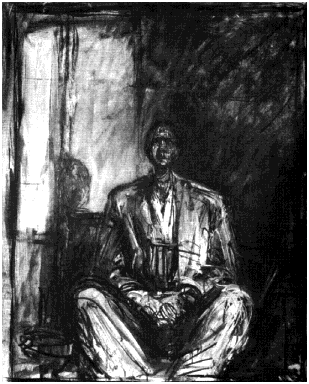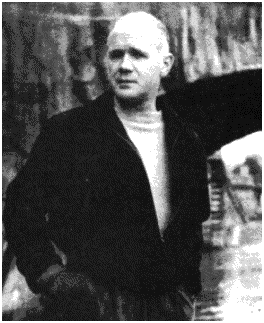Can You Dig It?

When Genet was later asked if his homosexuality had troubled the Panthers, he replied:
-
It certainly troubled me more than it did them. They found out very quickly that I was a homosexual. But not once did they make a remark, an allusion or a joke. It wasn't by tactfulness. Quite simply, I think they were just short on time and they couldn't have cared less what I am. When a Panther named Zayd came to meet me in Montreal, he had in his hands the first copies of Funeral Rites to come out as a paperback in America. He said to me laughing: "I read it on the plane." That's all he said. Period.
A month later, after public demonstrations by groups of American homosexuals and women's liberation people, the Black Panthers wrote to me, asking for an article on homosexuality because it was a subject they didn't understand very well and one in which I was better qualified to speak than they. Quite simply, I sent David a letter in which I explained to him that, like the colour of one's skin, homosexuality was a matter of faith; that it did not depend on us to be or not to be homosexuals.
By chance, or more likely by intent, Huey Newton, who had just got out of prison, published an article in the party newspaper in which he urged the Panthers to try to understand all minorities, to learn to distinguish between minorities and individuals and to distinguish among individuals who were revolutionaries and those who were not. Newton explained that the important thing was not whether to be or not to be a homosexual, but rather whether to be or not be a revolutionary, for by being revolutionaries, homosexuals could prove themselves potential friends.
When asked whether his homosexuality helped him to become a revolutionary, Genet replied:
One is not a revolutionary just because one is a homosexual. What I mean to say is that there are some homosexuals who wish to affirm their difference and their special quality, and this need leads them to unmask the arbitrary character of the system in which they live. But there are others who wish to pass unnoticed and to blend into the system, therefore strengthening the system.
Let us say that homosexuality should lead the homosexual to indict the system; but, in reality, the system is a source of so much humiliation, fear and panic, and is often far stronger, that it forces a homosexual to dissemble and to bow down. When a pederast dyes his hair blue, he is able to launch a revolutionary programme by himself; but when, after dyeing his hair blue, he beefs up his breasts with hormones and goes to live with a man, he is merely parodying the system. He is keeping up appearances and not challenging anything at all. Society is amused. He becomes a kind of curiosity, which the system is quick to digest.
In France Genet would lend his name to an early gay liberation publication, but the fight for gay rights was never high on his list. He insisted in a 1983 interview that he had never written fiction to promote gay rights or any other political cause:
I did not write my books for the liberation of the homosexual. I wrote my books for another reason altogether --- out of a taste for words, out of a taste for commas, even punctuation, out of a taste for the sentence.
Genet remarked that artistic and political revolutions do not take place at the same time, that revolutionary political messages are often presented in a conventional academic style.
He next observed that the man who had done the most to liberate homosexuals, although he himself was heterosexual and in no way liberated, was Freud, by revealing the undifferentiated sexuality of children, their bisexuality.
On 20 March Genet attended a benefit for the Panthers in Los Angeles, given by Dalton Trumbo, a screenwriter who himself had been blacklisted during the McCarthy era for his earlier membership in the Communist Party. For a decade Trumbo had been unable to sign scripts with his own name and he had been employed infrequently and paid badly. Otto Preminger had been the first producer with the courage to hire him again under his own name and at the going rate, for the screen adaptation of Nelson Algren's The Man with the Golden Arm.
Trumbo's party raised some 4,000 dollars for the Panthers. Jean Genet met Jane Fonda, who gave him her phone number; as Roger Vadim's ex-wife and the star of several French films (including Barbarella), she was fluent in French. She was then married to New Left activist Tom Hayden, a member of the "Chicago Seven" who had named the Panthers "America's Viet Cong." She wished to work on a film with Genet on behalf of the Panthers, a project that was discussed but never materialized. She remembers that she and Genet got along marvellously well.
The next morning Genet awakened bright and early in a strange Hollywood mansion. No one was awake. Genet couldn't have spoken to them in any event, so he phoned Jane Fonda. She said she'd be right over to rescue him --- but where was he staying? He said he had no idea. "Listen," she said, "Go outside and look at the swimming pool, then come back to me and describe it." Genet did as he was told and Fonda exclaimed, "Oh, you're at Donald Sutherland's, I'll be right over."
On 21 March Genet appeared at a fund-raising endeavor at Stanford University, sponsored by the French Department. A cocktail party was given later by historian Gordon Wright. Genet praised the Panthers' authenticity, which he compared to that of the Marquis de Sade. When Panther Elmer "Geronimo" Pratt discovered that Wright's son had brought home a Black army buddy, Pratt insulted the Black soldier, calling him an "Uncle Tom."
 Then Ken Kesey, the acid-tripping author of One Flew Over the Cuckoo's Nest, showed up stoned to meet Jean Genet. As a woman translator from Ramparts worked overtime to facilitate their conversation, the blissed-out Kesey pointed down to his feet and said: "I'm wearing green socks. Green socks. Can you dig it? Green socks. They're heavy, man, very heavy."
Then Ken Kesey, the acid-tripping author of One Flew Over the Cuckoo's Nest, showed up stoned to meet Jean Genet. As a woman translator from Ramparts worked overtime to facilitate their conversation, the blissed-out Kesey pointed down to his feet and said: "I'm wearing green socks. Green socks. Can you dig it? Green socks. They're heavy, man, very heavy."
The translator, not knowing that "heavy" meant "significant," even "marvellous," translated, Les chausettes vertes, elles sont très, très lourdes, and Genet managed a quizzical, sympathetic smile for these burdensome socks. Next Kesey proposed playing basketball: "There's nothing better than playing basketball with Negroes." David Hilliard announced: "This motherfucker is crazy and we're getting out of here." The bewildered Kesey asked his hosts, "Don't they like basketball? I thought Negroes loved basketball."
In Oakland, California, the birthplace of the Panther movement, Genet's friends decided he was not well enough dressed to represent their movement (the Panthers themselves were responding to each new downturn in their fortunes by being even better dressed, even more disciplined). A Black haberdasher in Oakland was happy to offer free new trousers and a leather jacket, which Genet then wore day in and day out, extremely proud of the gifts. He slept in his clothes, seldom bathed, and lived on a diet of Gitane cigarettes and Nembutals.
While in Oakland, David Hilliard rang up Jessica Mitford, the author of The American Way of Death and the wife of an important leftist lawyer, Bob Treuhaft. "We've got this cat Jean Genet coming to town and we want you to give a fund-raiser for him."
"When's he coming?"
"On Sunday."
"Oh. And whom do you want me to invite?"
"All the Bay Area intellectuals."
Mitford put out the call and a huge mob showed up and consumed the red and white jug wines the hostess had provided. Since she hadn't actually spoken to Genet, Mitford was worried that he might not show up. The first group of Panthers arrived in dark glasses, Afros and military garb and sat, unsmiling, on the couch. Then someone brought Genet, with whom the radical Mitford chatted in French in her polite way. She remarked that the party seemed to be going well. Genet said, dryly, "Madame, it's always nice to see people before one begins to talk politics."
Since the room was crowded and everyone was standing and Genet was tiny, a stepladder was found for him. A local professor held up his hand and asked, "What can we do to fight racism in America? We're helpless." Genet exploded: "I'm a foreigner and you have the nerve to ask me that question?"
Tom Hayden was present, and David Hilliard asked him publicly, "You were one of the Chicago Seven. Why did you allow Bobby Seale to be shackled and gagged? You must explain yourself." Hayden demurred, pointing out that people hadn't come to hear him. When pressed, Hayden at last said, "We must have a campaign against racism, just as we already have a campaign against the war."
A left-wing lawyer then put his fingers up in the peace symbol. Infuriated by the lawyer's fatuousness, Hilliard swung an empty half-gallon wine bottle at him. The bottle slipped out of his hand and fell on the head of the ten-year-old daughter of Beat poet and playwright Michael McClure (author of Meat Science Essays). The little girl screamed. Bob Treuhaft, who was in the other room and hadn't seen what had happened, said, "Do stop crying." Michael McClure exploded and said, "Women and children get hurt when people start talking politics." In her best English manner, Jessica Mitford announced, "I think the party's over now," and chased them all out. "Genet was loving every moment of it," she recalled.
Edmund White
©1993 Vintage Books